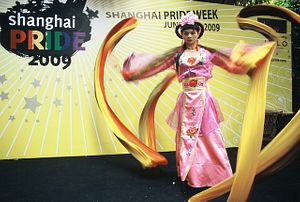Several weeks ago, the popular Chinese website, 163.com (ranked the 27th most visited site worldwide by Alexa), published a news video online. It was produced by two Chinese folk photographers, Masa and Mojo, who had spent half a year visiting Chinese gay and lesbian communities in eleven cities and collecting their stories. Their video, From Dark Night to Daytime recounts the stories of 48 gay men and women and their families in China. The publication of the video is seen as remarkable in Chinese civil society, where public discussion of such stories in official media remains a taboo.
The Chinese LGBT community and culture have attracted interest among Chinese youth in recent years. Evidence of this is the use of the Internet slang term gao-ji, indicating two men of the same sex having an affair, which has become well-accepted and entered daily use (including among straight people, as a way of teasing each other). The prevalence of the Internet has contributed to gay activism in contemporary China. Gay parades and campaigns have emerged, as young and sometimes middle-aged Chinese are inspired by the LGBT activism overseas that they learn about online, and by events such as the coming-out of celebrities such as Tim Cook and Anderson Cooper, the legalization of same-sex marriage in Western countries, and the discussion of a same-sex marriage bill in Taiwan, with its linguistic and cultural similarities with the Mainland. Some have taken bold actions. In 2010, two Chinese men, Wenjie Pan and Anquan Zeng, hosted the first public same-sex wedding ceremony in Sichuang, a city in China’s southwest.
The Wall Street Journal reported that the Chinese gay dating application Blued has scored a $30 million round of investment co-led by DCM Ventures, as its users reached 15 million at the end of last year. This number is likely to grow, as China has both the world’s largest population and the most Internet users. A concomitant outcome, however, is worrisome. Most gay Chinese men who use online dating applications do so to have casual sex, and this has fueled a spike in sexually transmitted diseases (STDs), including HIV/AIDS. Thus, some middle-aged and older Chinese associate homosexuality with infection by HIV/AIDS and other STDs, and this has contributed to discrimination against the gay community.
One main reason why many people in China oppose homosexuality is because it clashes with their notions of traditional Chinese values. Some even think that homosexuality does not exist in China, and must just be something from the West.
Yet, the intolerance with which gay activism is met does not have its origins in China’s Confucian tradition; indeed, homosexuality was prevalent in ancient China. It helps in this regard to distinguish between same-sex sexual behaviors, same-sex relationships, and same-sex marriage. In ancient China, which was polygamous, same-sex sexual behaviors were well-received and tolerated. Positive descriptions of homosexual behavior, or Nan-Feng as it was called, in historical records and in Chinese literature can be dated back to the Han dynasty (206 BC–220 AD). Such behavior was commonplace among the Chinese scholar-officials (Shi-Da-Fu), as they served as an embodiment of their social class and wealth. Same-sex relationships could be observed, but they were presented more as “affairs” between two men. Marriage, however, was heterosexual, involving one man married to one or several women.
Traditional Chinese gay culture changed with the introduction of monogamy from the West, and the establishment of institutions and “ethical standards” that regulated sexual behavior, thus shaping contemporary Chinese attitudes and social values. This produced what we know of today as a “normal” (as it is perceived) sexual orientation, in turn contributing to the development of conservatism and homophobia.
Aligning with the Confucius central value of being neutral and benevolent, a polygamous ancient China allowed same-sex sexual behavior and acquiesced in same-sex relationships, despite China’s family-centered values that promote the continuance of one family’s ancestral line through marriage.
Yuxin Zhang previously worked as an aide to Congressman Ed Royce. He is a member of the National Committee on US-China Relations as well as the CSIS Pacific Forum Young Leaders Program.

































